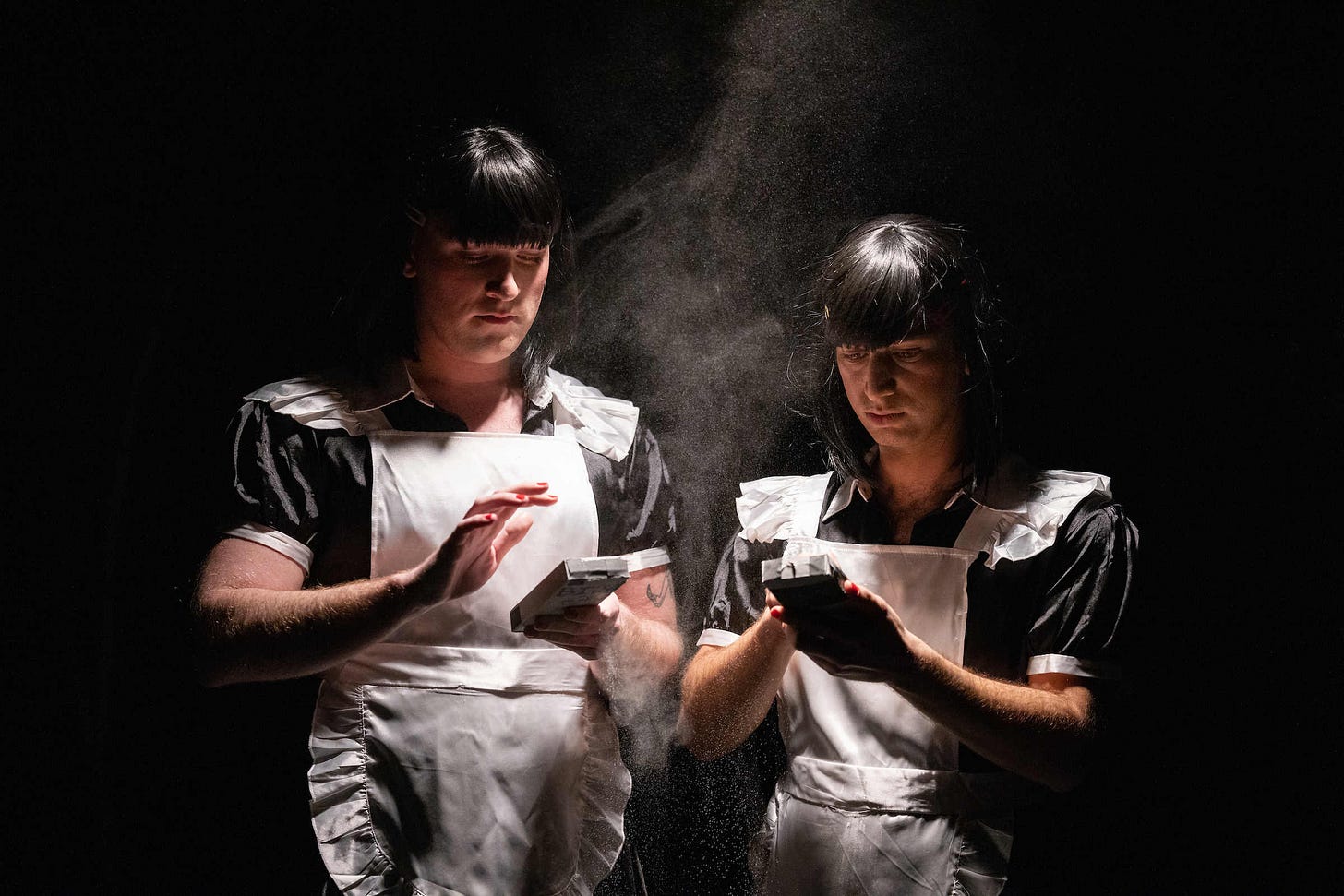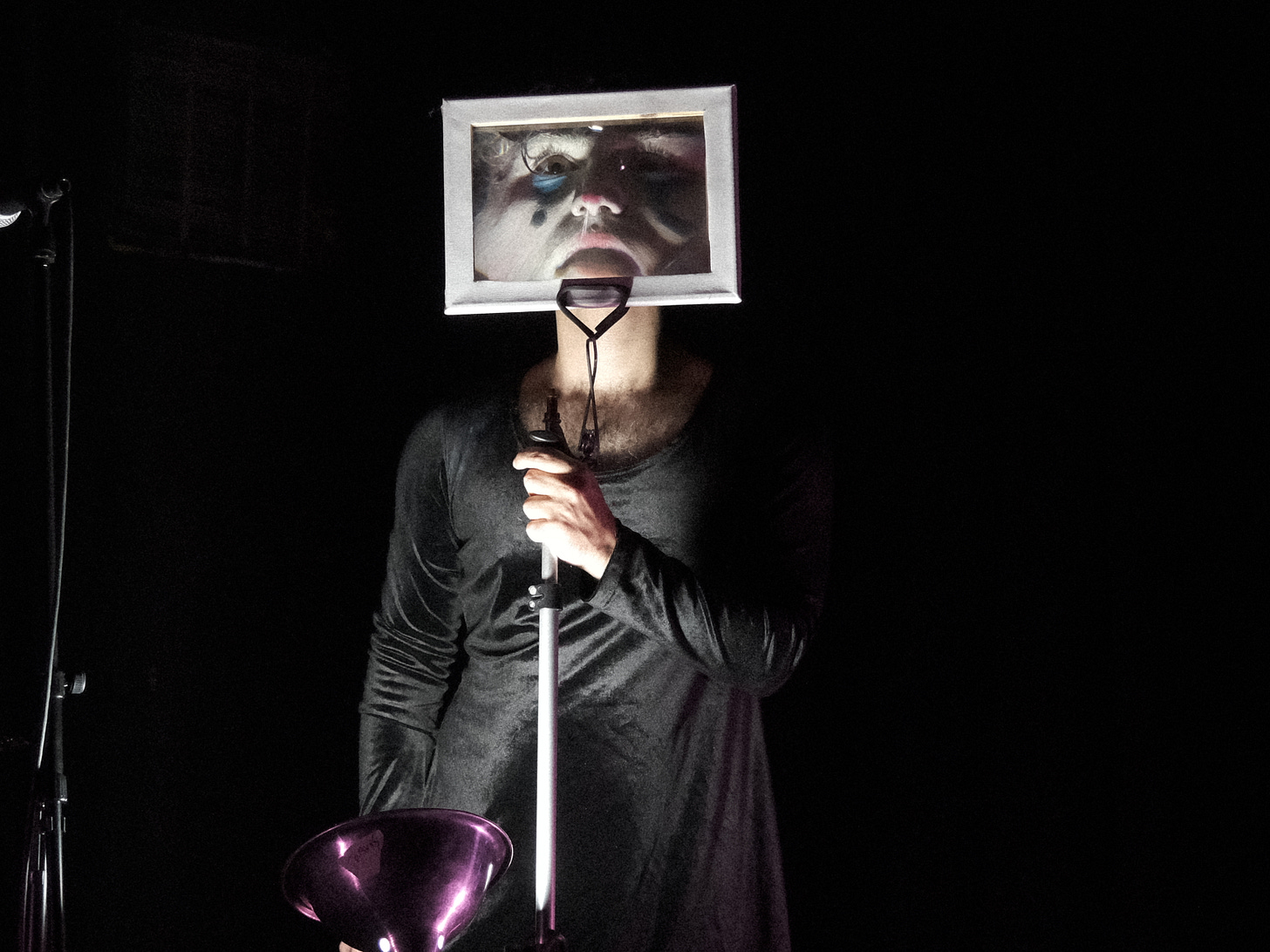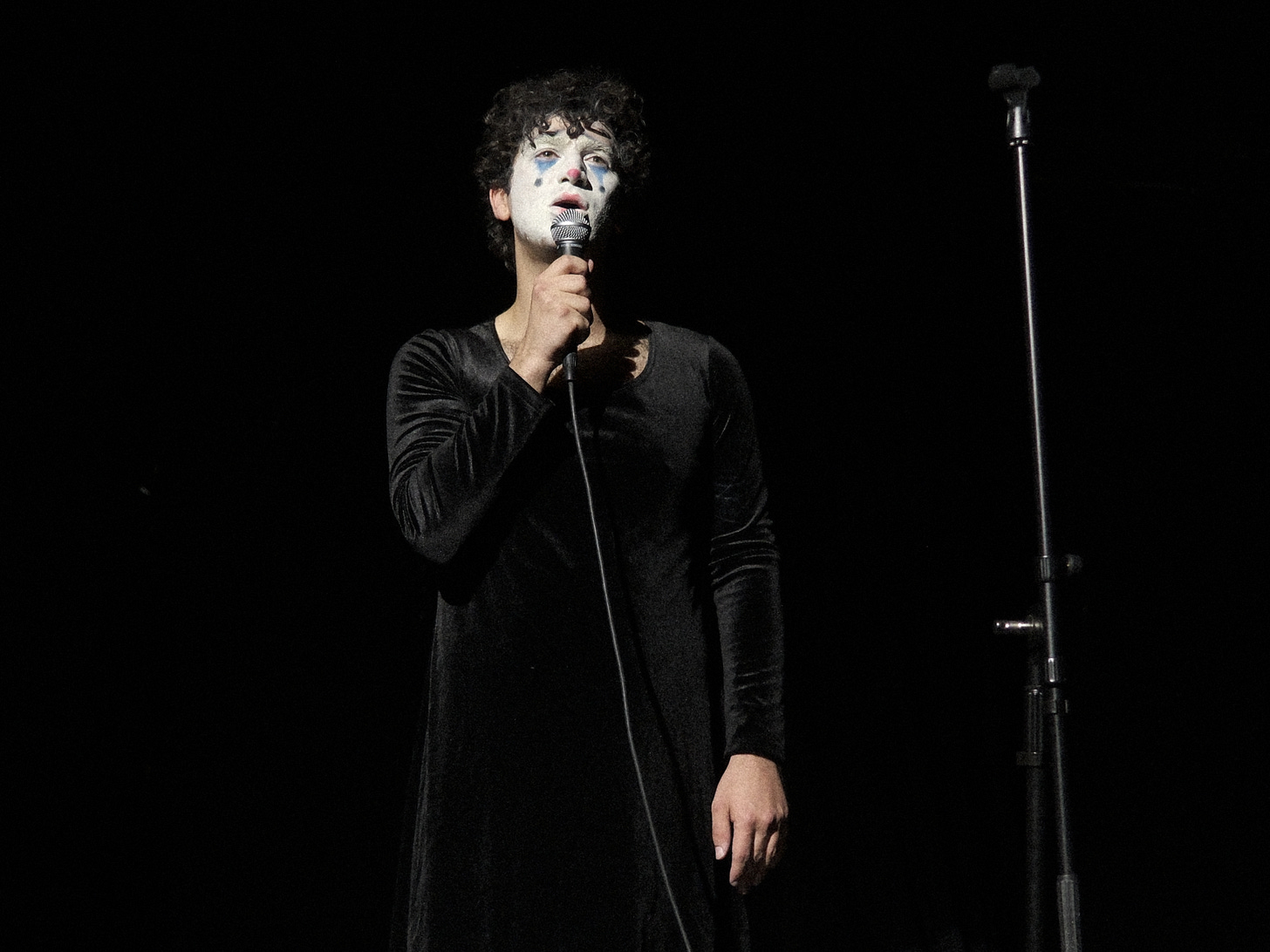Trying Again, Failing Again in ‘Das Ersatz’
Dance-theater duo Cosimo Pori and Travis Amiel ponder our replaceability
Cosimo Pori and Travis Amiel’s first show, Das Sofortvergnügen (THE INSTANT PLEASURE), opened with the two dressed like maids and tapping frantically at oversized prop cell phones. As the “tapping” grew faster and wilder, baby powder billowed out of the phones, filling the air until Travis and Cosi (also the character names) were barely visible through an overwhelming cloud of haze.
It’s the kind of image this duo loves: arresting, yet deeply silly. And in Pori and Amiel’s chaotic creations, one bizarre tableau will have barely set in before they are conjuring the next.
As the dust settled, Travis, now alone onstage, began to sob uncontrollably. Cosi returned with pom poms and danced around him, as “I Can’t Stop the Loneliness” by Japanese singer-songwriter Anri played. Travis’ despair turned to tears of joy. Seemingly from nowhere, he produced pom poms of his own and joined the dance.
Together, Pori and Amiel create dizzying dance-theater spectacles. Pori is a trained dancer and poet; Amiel is an interdisciplinary artist with many digital works under his belt, including Tarvis: A Sitcom. The two first made a name for themselves with THE INSTANT PLEASURE, which played the Exponential Festival this year following a run at Philadelphia Fringe. Each of their works explores one unifying theme through a frenetic mix of poetry, music and movement, drawing equally from Pina Bausch and SpongeBob SquarePants.
THE INSTANT PLEASURE explored our insatiable desire for convenient pleasures and instant gratification, beginning with technology but widening into a meditation on queer existence in a capitalist society.
For their new show Das Ersatz, which runs June 6-16 at The Brick, Pori and Amiel are tackling replaceability. “Erstaz” is a German word roughly translating to a “substitute good” – often inferior to the original it is replacing. The show follows a pair of hapless clowns stumbling from job to job, friendship to friendship, always finding themselves expendable. But is there beauty to be found in our replaceability?
I spoke with Pori and Amiel about their process, losing your job (a lot), and why gay people love trains.
JOEY SIMS: How did you two first meet?
TRAVIS AMIEL: We first met at The Tank in 2015 through their monthly series Fast and Furious. Cosi was performing, I was performing, and I was like, “You’re a cool dancer!” Then we made a couple of short pieces together, and found we have very similar tastes.
COSIMO PORI: We have really similar senses of humor and cultural touchpoints – The Simpsons, SpongeBob, Pina Bausch, Cori Anderson, Bjork.
JOEY: What tends to be the process for creating your shows?
TRAVIS: For these two shows we’ve made, it has started with the title, which then leads to all of the sub-topics. Then we collect GIFs, memes, quotations, pieces of choreography to replicate or reference. And everything gets funneled into the devising document.
COSI: I was always told that starting with the title was a sin: “The title should never inform the content of the work!” But it is the best prompt ever for us – how can we make an entire show about instant gratification, or about replacements?
TRAVIS: And then with THE INSTANT PLEASURE, I also had the opening image in my head.
JOEY: Of the dust billowing out of the oversized cell phones?
TRAVIS: The original idea was a row of people holding phones, but everyone had huge pointy-finger hands made of bread. And as they tapped, the bread-hand would disintegrate. But I didn’t know how to do that. So, the idea of you disintegrating while using your phone turned into the fog coming out of the phone. We like those bold visual gestures, rather than literally saying, “This is the thesis.”
JOEY: What’s a favorite moment or image of yours from THE INSTANT PLEASURE?
COSI: “The Marshmallow Problem.” [Travis presents Cosimo with two options: eat one marshmallow now; or, wait until the end of the show and everyone gets a marshmallow, plus Cosimo gets two.] Especially when I ask to call my therapist, and Travis tells me I don’t have one. And then the Kill Bill siren comes in as I smack the tray of marshmallows out of your hand.
It’s really silly, but also all-encompassing. I can’t do one or the other, and I can’t keep thinking about it – so I’m just going to destroy the means, because I can’t deal with this right now.
JOEY: Who are the two characters that you are playing? Do you think of them as characters?
COSI: We write thinking about caricatures that work with the concepts. In Das Ersatz, the theme is trying again and repeatedly failing. So, I think of myself…but I also think of a Pollyanna-type person who is so positive, they can’t see how much things suck.
JOEY: How did you arrive at that theme of replaceability for your new show?
TRAVIS: It started with just the word “ersatz.” Cosi said it one day and I was like, hmm, that’s a funny word. And then Cosi was very interested in exploring themes of replicability in jobs and labor. Because of what was happening in Cosi’s life.
COSI: Right — initially, we wanted it to be this exhaustive treatise about food. But then I got fired from this job that I was convinced was my dream job – after a month and a half. Then I got a new job, and a month and a half later I got fired again. My life necessitated a tonal shift away from, like, how wacky tofu is.
TRAVIS: There was a lot of academic and historical research but that just didn’t happen because we were finding so much fruit just from…
COSI: …from all my misfortunes.
JOEY: So the focus ended up landing more on work and labor?
COSI: Overall, it has been more about identity and personhood.
TRAVIS: In exploring replacements and substitutions, the question I keep asking is: “Why do we judge one thing as being the real thing, and another as the substitute?” So that has inspired subtext around clothing, food and where our value systems originate from.
COSI: And then once you start thinking about those [ideas], we kicked the hornet’s nest of free will.
JOEY: So um, wait, how do we get from replaceability to free will?
COSI: You’ll have to see the show to find out!
JOEY: You also incorporate tons of memes, quotations and cultural references into your shows – why do you like including all of that?
TRAVIS: We speak to each other in these references. Especially when we’re texting, these phrases, these aphorisms, it’s just how we talk now. So it feels natural to use these themes in the show when they feel connected to the topic.
COSI: Memes are like modern-day proverbs. Instead of, “If you give a man a fish…,” now it’s, “That’s that me, espresso.”
JOEY: And how do trains fit in? On the poster you’re both dancing on top of a train.
T: That feels like a ‘buy a ticket’ answer.
C: But also like, gay people love trains.
JOEY: We do love trains.
C: We both love trains, we spend a lot of our time on trains. But there’s also an innocence there; being into trains is so darling and so childish in a beautiful way. And a lot of this show has that juxtaposition between the mundane and our childlike impulses.






